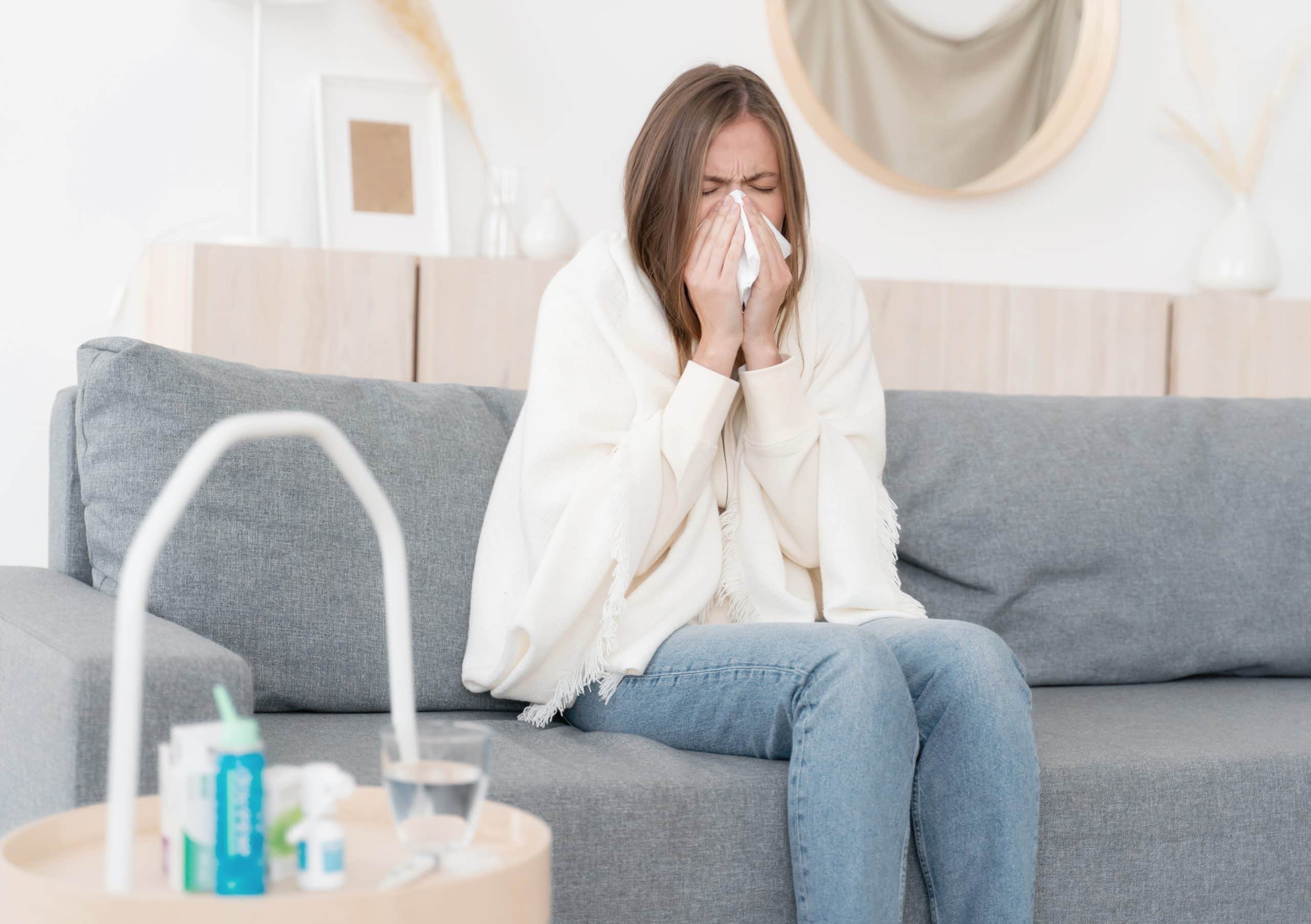For some, allergies are a year-round annoyance.
But why do allergies make you cough (& what can you do about it)?
For some, it starts as a tickle in the throat. For others, it’s shortness of breath and a tight feeling in the chest. But either way, allergy coughs can be uncomfortable, annoying, and downright confusing.
After all, how do you know if your cough is caused by allergies or something more serious?
While seasonal allergies can make you cough, not all coughs can be so easily explained away. In this article, we’ll explain the why and how behind your allergy cough.
Why Do Allergies Make You Cough?
It’s no secret that allergies can make you cough, but why does this happen?
In some people, otherwise harmless substances can trigger a response from an overactive immune system. What we call an “allergic reaction” is the result of the body sending antibodies to attack the so-called “intruder.”
Common allergy symptoms include itchy eyes, runny nose, sneezing, and of course, a cough.
Most of the time, allergy coughs are a secondary symptom—that is, the cough is caused by another allergy symptom.
- Postnasal Drip – Postnasal drip due to a runny nose can trigger a cough reflex in the lungs.
- Throat Irritation – If nasal swelling and congestion force you to breathe through your mouth, the resulting dryness and throat irritation can lead to a cough.
- Asthma – In people with asthma, a dry cough may be the first (if not the only) sign of an asthma attack.

Allergy Cough vs. Cold/Flu/COVID Cough
In a post-pandemic world, many people are eager to blame their cough on seasonal allergies to avoid missing out on social events. But how do you know if your cough is due to allergies or something more contagious?
The time of year is typically your first clue, but here in Florida, allergy season lasts pretty much year-round. At FTPC, we consider two things: how your cough sounds and your other symptoms.
There are two main types of coughs: wet and dry coughs. Allergies usually (but not always) cause dry coughs, so if you’re dealing with prolonged chest congestion, it’s more likely to be a virus.
Your other symptoms are another clue to the cause of your cough.
Allergies are typically behind symptoms like sneezing and itchy eyes. Sore throat, fever, headache, and fatigue, on the other hand, are common symptoms of viruses. Asthma attacks will involve coughing with difficulty breathing, but not the congestion associated with viral bugs.
Can You Develop Allergies Suddenly?
Yes, seasonal and food allergies can start (or end) at any time in your life. So even if you’ve never suffered from allergies before, there’s still a chance that your cough is actually due to an allergic reaction.

How To Treat An Allergy Cough
Whether your cough is caused by postnasal drip or irritation, alleviating your allergies is the best way to improve your cough.
If pollen bothers you, try to limit time spent outdoors and keep windows closed when you’re inside the house. If you leave the house, change your clothes and take a shower when you return, as this will remove any allergens that may have landed on your clothes.
If you’re allergic to dust mites or pet dander, limiting your exposure may be easier said than done. However, there are some things you can try.
Investing in HEPA air filters or indoor air purifiers can help filter allergens from the air, while a saline rinse with a neti pot can remove allergens from your nasal passages.

Prescription and over-the-counter medications come in many forms—from pills to nasal sprays—but some find that they come with unpleasant side effects. If you find that allergy medications aren’t working for you (or if you just need some extra relief) there are a few natural remedies you can try.
Regardless of your allergy trigger, remember to stay hydrated. Drinking lots of fluids can help thin out mucus and even reduce the amount of histamines in your system.
One thing that doesn’t seem to help with allergies, however, is local honey. However, honey can be a great sore throat remedy, so if you love to drizzle some in your tea, it certainly won’t hurt.
Get Well, Stay Well
Fortunately, allergies tend to be short-lived and easily treated. And because they can’t be passed from person to person, you don’t need to let allergies stop you from enjoying your life!
However, if your allergy symptoms are severe enough to interfere with your daily activities, that’s something you’d want to bring up at your next annual physical.


